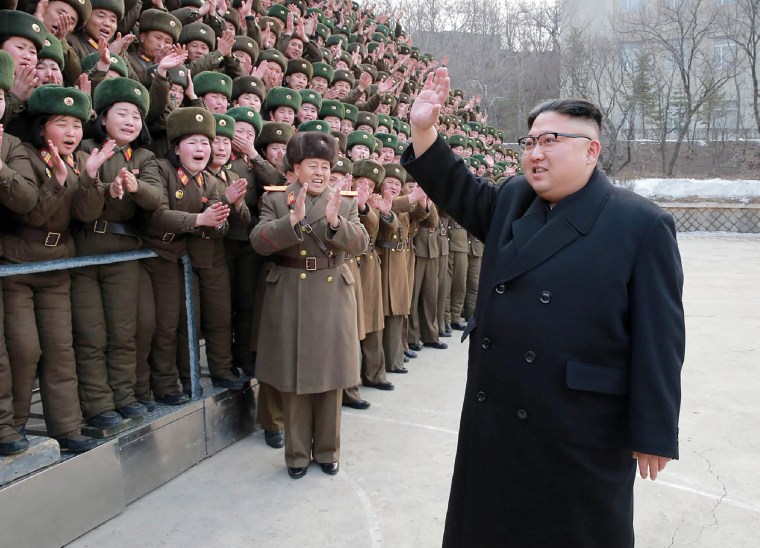Even as President Donald Trump ratcheted up the rhetoric on North Korea, market observers still appeared relatively unalarmed by the threats lobbed between Trump and officials in Pyongyang.
But cracks are beginning to show. The Dow Jones Industrial Average saw its biggest dip since mid-May on Thursday, down 205 points, following similar drops in the Asian and European markets; and the VIX, or volatility index widely used as a proxy to gauge market fear, soared by 44 percent to its highest level since Trump was elected.
As tensions began to rise earlier in the week, Wall Street reaction was muted, with investors responding to Trump's verbal bluster as just that.
“I think a lot of people do believe this is just huffing and puffing — and when push comes to shove, there’s not going to be any pushing,” Lawrence White, professor of economics at New York University's Stern School of Business, told NBC News.
“The verbal jabs coming out of Pyongyang and D.C., I think, are more about negotiating than communicating action,” agreed Mitchell Goldberg, president of ClientFirst Strategy. “Everyone is posturing ahead of negotiations to have as strong a hand as possible.”
Trump’s use of inflammatory language in person and on Twitter is unprecedented and potentially problematic from a diplomatic standpoint, but evidence of an economic impact has been less clear cut so far.
“The rhetoric Trump uses is absolutely atypical for a U.S. president, so that could be a little bit of a wild card [but] it’s hard to find a tipping point where this next step is going to change everything,” said Kent Boydston, a research analyst at the Peterson Institute for International Economics.
“If there was evidence [Kim] is really mobilizing an attack or vice-versa... we could go down 3 to 4 percent in one day.”
Related: Miscommunication Is the Biggest Threat in the North Korea Standoff
“Markets are always trying to anticipate, and to the extent that it has been building a while, markets have somewhat built in… whatever negative feelings they may have about the adversarial rhetoric that’s been going on,” White said.
Scott Wren, senior global equity strategist at the Wells Fargo Investment Institute, attributed this week’s downturn in the major indices mainly to economic indicators rather than geopolitical brinkmanship. “There are a lot of reasons for the market to be tired right now… Valuations are stretched, the Fed’s in a rate hike cycle, gross margins are starting to be squeezed,” he told NBC News.
“The market was bound to go down eventually, and with the Dow in the low 20,000s, this is not a big retreat to worry about,” Goldberg said.
“There’s a silver lining,” he added. If Congress fails to meet Wall Street’s expectations upon its return from summer recess, that disappointment at least won’t send stocks crashing down from their peak. “We want stocks to ratchet down ahead of the budget negotiations,” Goldberg said.
Related: Why the Red-Hot Stock Market Could Be Close to a Cooldown
To the extent that experts expressed trepidation, it was focused on what they characterized as a slim chance of an armed conflict. An actual military strike by North Korea on an American target would have economic as well as geopolitical repercussions, Boydston said.
“Looking historically, there’s relatively little volatility when it comes to stock market and North Korean provocations,” said Boydston.
“If they started launching missiles towards U.S. territory, Guam or Hawaii, I do think that would be a bigger and more direct provocation to the United States than we’ve seen before. I would say that would certainly be more of an escalation — that could potentially roil the markets a little bit more,” he told NBC News.
Not too many people believe a North Korean missile could reach the U.S. … but a regional conflict due to escalated tensions might be an issue for global markets.
“If we saw any movement out of North Korea or if we saw any movements out of the United States… If there was evidence [Kim] is really mobilizing an attack or vice-versa, obviously that would be very negative. We could see a huge drop in the stock market — but we’d have to get to that point,” said Peter Cardillo, chief market economist at First Standard Financial. “We could go down 3 to 4 percent in one day.”
And the prospect of the Kim regime escalating any display of military aggression into a regional conflict remains a remote but worrisome possibility, experts say.
“I don’t think there are too many people out there who think a North Korean missile could reach the U.S.,” Wren said. “The market’s not worried about that… but a regional conflict that would be accelerated due to North Korea doing something to one of its closer neighbors, that might be an issue.”
“The ultimate problem we have with North Korea is they do have nukes and Seoul is only 30 miles away from the DMZ,” Goldberg said. “That’s a frightening prospect.”
